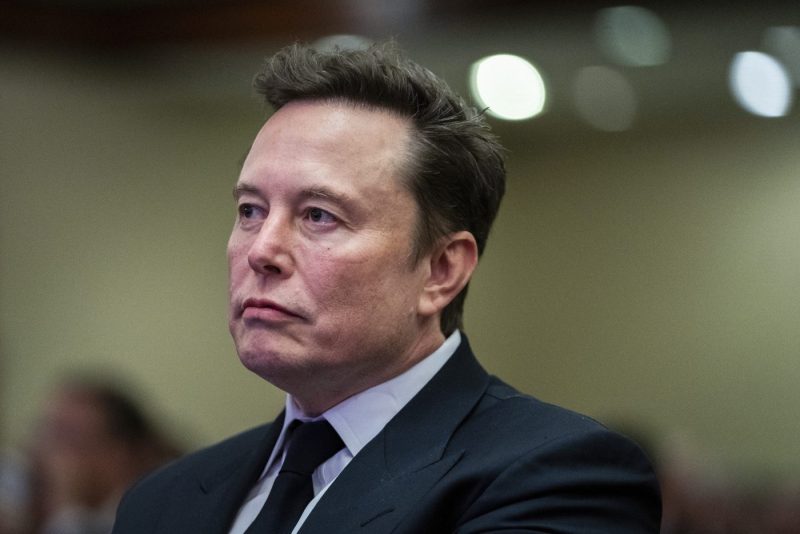(NewsNation) — Tech billionaire Elon Musk‘s net worth has declined following the Trump administration’s attempts at imposing new tariffs.
The Tesla and SpaceX CEO’s net worth has fluctuated in recent months, primarily due to his recent business and political ventures, including his role in the Department of Government Efficiency.
Tesla’s stock dropped 5.2% on Monday, a loss attributed to the threat of tariffs targeting imports from Canada, Mexico and China, Newsweek reported. It’s down 3.3% as of Feb. 6.
Tesla’s U.K. sales fell nearly 12% in January, even as monthly EV registrations in Europe’s biggest battery-electric market surged to a record, according to data published by New AutoMotive.
Elon Musk’s net worth
Musk has made a high-profile foray into politics, with much of his 2024 dominated by his financial support of Trump, on whom the billionaire CEO spent $250 million in what proved a successful campaign to return to the White House.
His net worth stood at about $433 billion before the recent drop, Newsweek reported, but fell to around $418 billion, rebounding slightly to $424 billion by Tuesday.
Federal workers fear mass firings as buyout deadline looms
As of Feb. 6, Musk’s net worth stands at $414 billion, according to the Bloomberg Billionaires Index. Forbes’ real-time billionaires list from that same date reports Musk’s net worth is $401.8 billion.
Musk’s wealth had previously surged, reaching $486 billion in December 2024, according to Bloomberg, up from $262 billion before the election, per Newsweek. In November 2024, Musk’s net worth was recorded at $307.4 billion by Forbes and $319 billion by Bloomberg.
What caused the decline?
The threatened tariffs are the main factor behind Musk’s recent financial setback. They threaten to raise production costs for Tesla and other companies relying on global supply chains for key materials like aluminum and lithium, crucial for electric vehicle batteries.
Concerns about potential retaliatory tariffs from China, a key market for Tesla, have caused additional uncertainty, putting pressure on Tesla’s stock.
Although SpaceX is privately held, the new tariffs could also impact its supply chain, including components needed for the Starlink network.
What is Elon Musk’s role in DOGE?
Trump originally tapped Musk and Republican presidential candidate Vivek Ramaswamy to co-lead the Department of Government Efficiency after his reelection last year.
Since then, Ramaswamy left DOGE.
Musk is the sole head of DOGE after Ramaswamy, who is planning to run for Ohio governor in two years, left. The new administration hasn’t yet said if Musk will formally join the government as part of his work on DOGE.
Trump to create task force ‘to eradicate anti-Christian bias’
Musk had pledged to cut $2 trillion in government spending and restructure federal agencies with “mass headcount reductions across the federal bureaucracy.”
The idea for DOGE also appeared to have come from Musk, who discussed the need for a “government efficiency commission” while campaigning alongside Trump.
While it’s not completely clear what Musk has in store for DOGE, he has provided some clues.
Trump tariffs
Trump said Friday he would place a 25% tariff on imports from Canada and Mexico, as well as a 10% additional tariff on all imports from China. Energy resources from Canada will have a lower 10% tariff.
The president wrote on Truth Social that the tariffs are meant to end “the decades long RIPOFF OF AMERICA” with regard to “TRADE, CRIME, AND POISONOUS DRUGS.”
The tariffs against Mexico and Canada have since been paused for 30 days after Trump struck a border security deal with Mexican President Claudia Sheinbaum and Canadian Prime Minister Justin Trudeau.
Tariffs are taxes on goods imported from other countries. They are typically charged as a percentage of the price a buyer pays a foreign seller.
When companies import goods from abroad, they pay the tariffs to the U.S. government. However, economists warn those costs eventually get passed on to American consumers through higher prices.
Trump has acknowledged that American consumers could bear some of the cost of the tariffs.
Andrew Dorn, Patrick Djordjevic and Safia Samee Ali and Reuters contributed to this report.
